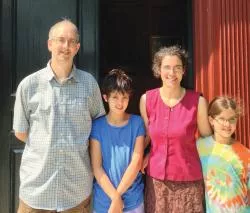Philosophy Professor Alan Baker Leads Tours on Life of George Berkeley

Alan Baker and his wife, Shelley Costa, are living at Whitehall Museum with their daughters and will engage visitors about the property.
Newport This Week: Berkeley Scholars Breathe Life into Whitehall
Four philosophers from the Texas A&M-based International Berkeley Society – Alan Baker, Scott Breuninger, Richard Brook, and Nancy Kendrick – will present guided tours of Whitehall through July and August. The scholars, all kindred spirits who have settled in at Whitehall for the summer, have interests which range from intellectual history and the 18th-century, to feminist history of philosophy. Guests have the unique opportunity to learn more about Berkeley and his influence on the intellectual life of Colonial America and the architecture he shaped by introducing the first Palladian-style residence in New England.
The philosopher-guides are impressive in their own right. Alan Baker is an associate professor in the Department of Philosophy at Swarthmore College (his special interest: the intersection between philosophy of math and science).
...
A quick primer: According to Baker, “Berkeley would adhere to the if-a-tree-falls-in-the-forest-and-nobody-is-around-to-hear-it-does-it-make-any-noise school. His view was that physical objects don’t exist. A chair, for example is a bundle of perceptions. Each of us has an idea of what it is through these perceptions.” Baker also added that Berkeley’s ideas would be the antithesis of modern scientific principles, “which hold that all is material within material, or Descartes’ ideas that there is the physical world of tables and chairs and then a realm of the mind.”
Whitehall is a museum of magnificent 18th-century bundles of perceptions – authentic desks, tables, lamps, all restored and lovingly replaced by the Colonial Dames who bought the house from Yale University which had purchased it from Berkeley (when it was Yale College) after three short years of his residence, with his wife, in Middletown (see sidebar).
“After he sold it to Yale, it began to fall apart,” said Baker. “It was a far cry from his arrival in 1729 when you could argue he was the most famous person in the world. He is not nearly as familiar to non-philosophers (now).”
The Bakers – Shelley and Alan – are thrilled to be back conducting tours on Berkeley Avenue. “I tell my students at Swarthmore that philosophy is an action,” said Baker. “You do philosophy by discussing it.”
Read the full article at Newport This Week.
Baker, who joined the Swarthmore faculty in 2003, teaches classes in philosophy of science, the philosophy of mathematics, and metaphysics.



